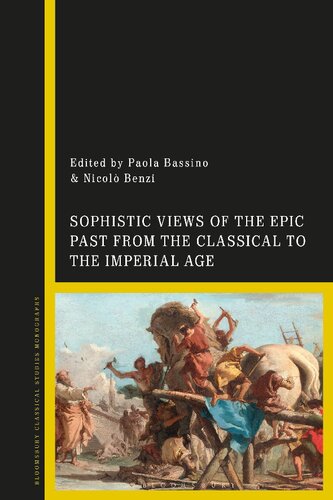Product desciption
Sophistic Views Of The Epic Past From The Classical To The Imperial Age Paola Bassino Nicol Benzi Editors by Paola Bassino; Nicolò Benzi (editors) 9781350255760, 9781350255791, 1350255769, 1350255793 instant download after payment.
This collection of essays sheds new light on the relationship between two of the main drivers of intellectual discourse in ancient Greece: the epic tradition and the Sophists. The contributors show how throughout antiquity the epic tradition proved a flexible instrument to navigate new political, cultural, and philosophical contexts. The Sophists, both in the Classical and the Imperial age, continuously reconfigured the value of epic poetry according to the circumstances: using epic myths allowed the Sophists to present themselves as the heirs of traditional education, but at the same time this tradition was reshaped to encapsulate new questions that were central to the Sophists’ intellectual agenda.
This volume is structured chronologically, encompassing the ancient world from the Classical Age through the first two centuries AD. The first chapters, on the First Sophistic, discuss pivotal works such as Gorgias’ Encomium of Helen and Apology of Palamedes, Alcidamas’ Odysseus or Against the Treachery of Palamedes, and Antisthenes’ pair of speeches Ajax and Odysseus, as well as a range of passages from Plato and other authors. The volume then moves on to discuss some of the major works of literature from the Second Sophistic dealing with the epic tradition. These include Lucian's Judgement of the Goddesses and Dio Chrysostom's orations 11 and 20, as well as Philostratus’ Heroicus and Imagines.
This volume offers new insights on the relationships between two of the main driving forces that shaped the intellectual discourse in ancient Greece: the epic tradition, which for centuries influenced all aspects of the intellectual and everyday life of the Greeks, and the Sophists, who operated within – and contributed to – new, changing cultural environments. The volume takes a diachronic perspective on the topic, including both the first and second Sophistic.
The first part of the volume, on the First Sophistic, discusses pivotal works such as Gorgias’ Encomium of Helen and Apology of Palamedes, Alcidamas’ Odysseus or Against the Treachery of Palamedes, and Antisthenes’ pair of speeches Ajax and Odysseus, as well as a range of passages from Plato and other authors. The volume then moves on to discuss some of the major works of literature from the Second Sophistic dealing with the epic tradition. These include Lucian’s Judgement of the Goddesses and Dio Chrysostom’s orations 11 and 20, as well as Philostratus’ Heroicus and Imagines.
The essays show how throughout antiquity the epic tradition proved a flexible instrument to navigate new political, cultural, and philosophical contexts. The Sophists, both in the Classical and the Imperial age, continuously reconfigured the value of epic poetry according to the circumstances: using epic myths allowed the Sophists to present themselves as the heirs of traditional education, but at the same time this tradition was reshaped to encapsulate new questions that were central to the Sophists’ intellectual agenda.


